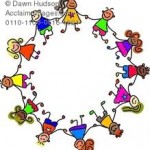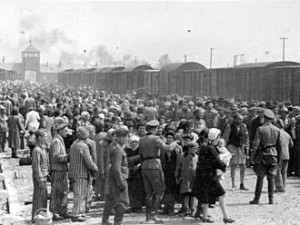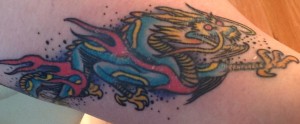 I don’t have a true sangha — that community of Buddhist believers who journey with you along your spiritual path. I have fellow travelers, certainly, and I’d like to think my approach to belief is eclectic enough that my ersatz sangha is pretty ecumenical.
I don’t have a true sangha — that community of Buddhist believers who journey with you along your spiritual path. I have fellow travelers, certainly, and I’d like to think my approach to belief is eclectic enough that my ersatz sangha is pretty ecumenical.
My cousin Sally, a born-Methodist who converted to Judaism for her ex; my friend Pat, a devout Christian; my sisters — one a devout Christian, one an atheist, the third a pagan Buddhist; my sons — one an agnostic, one a Wiccan; my wonderful husband, whose spiritual breadth & depth defy easy classification… And the many men & women (Hindu, Muslim, Unitarian, Jewish…) whose own paths twine through mine like moonflower vine — brightly shining in the darkness. 
Moonflower is an amazing flower — it blooms in the evening, on through the night. Luminously fragrant, bats & moths love it. If you plant a night garden — full of white flowers, and silver-leaved plants to shine softly after dusk — it’s a must.
My sangha — at least what serves me as one — is full of moonflower friends. Sometimes not visible in the happy daytime hours, but always there when it’s darkest. I love that metaphor (surprise), as it seems easy to me to be there to celebrate good times. I’d like to be the friend who manages to listen (not my strongest asset!), and helps you heal. Healing is kind of like moonflower’s night fragrance, I think. Not there in the bright times, but in the darkness.
Now that I’ve beat that metaphor to death… 🙂

More seriously? This blog is as much a sangha as any. Writing what it means to search for beginner’s heart, how hard it is to keep sight of that in the middle of politics, racism, social injustice… I don’t know that any community could be more helpful.
This is one of those moments in my life when my faith in people isn’t as strong as usual. Normally, I feel like most folks are okay. But lately, in the wake of Buddhists killing Muslims, and Muslims killing each other, and whites declaring open season on difference…? It’s hard.
Once, many years ago, I hit a comparable spiritual impasse. There were three murders close to me — no one I knew well, but the aunt of my son’s best friend, the dear friend of a sister-in-law, and a stranger I never met. It was too much for me. I went to a dear mentor — a brilliant Sho’ah scholar — who had studied the impact of the Holocaust through history. I asked him how he managed to look at the horrible things people did to each other, often in the name of God. And because my beliefs call me to compassion — if not love — I asked him how to love these murderers. A question I face once again.
Hank, that wise and gentle friend, told me, It’s not your job to love them, Britton. It’s God’s job. You can’t hate them, but you don’t have to love them. They turned their faces from God. God did not turn away from them.
I can’t tell you how that healed me. I only have to work on my compassion — hard enough! To have compassion for people who believe that guns solve anything? To have compassion for racists and murderers and rapists and men (& women) who want to relegate women to child-bearing machines? To have compassion for people who refuse to feel any for hungry children, veterans, elderly? This is difficult enough.
I don’t have to love the people who break my heart. That’s not my job. I just have to learn compassion. Thankfully, I have this amazing sangha to help me.

